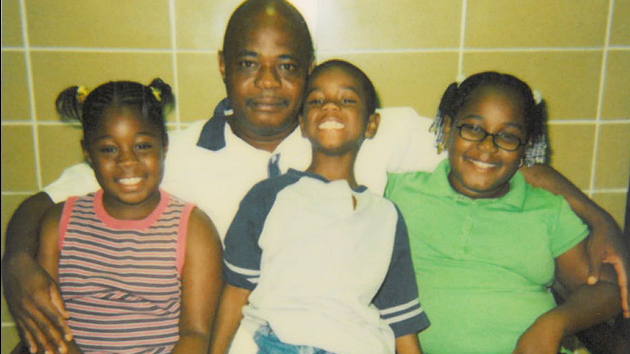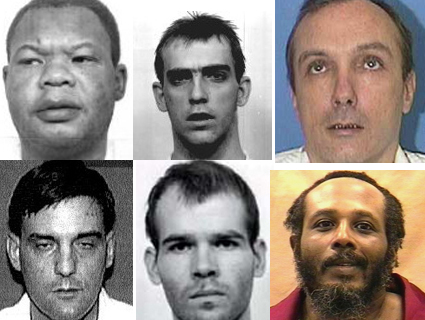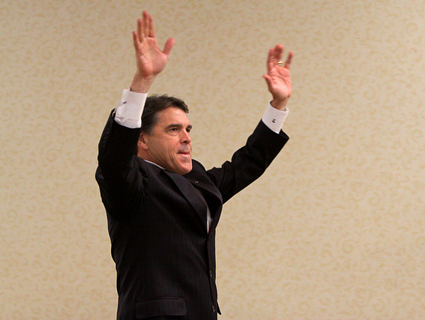
José Luis Castillo/EFE/ZUMA
Thirteen years ago, speaking at the University of the District of Columbia, US Supreme Court Justice Ruth Bader Ginsburg criticized the effectiveness of court-appointed lawyers for low-income people facing capital punishment. “People who are well represented at trial do not get the death penalty,” she said. “I have yet to see a death case among the dozens coming to the Supreme Court on eve-of-execution stay applications in which the defendant was well represented at trial.”
She wasn’t the first to draw this connection. In 1994, the legendary lawyer and death penalty opponent Stephen Bright, president of the Southern Center for Human Rights, wrote a seminal essay for the Yale Law Journal titled “Counsel for the Poor: The Death Sentence Not for the Worst Crime But for the Worst Lawyer.”
Very little has changed in the intervening 20 years. In 1997, for instance, a Georgia jury imposed a death sentence on Robert Wayne Holsey. (See “This Man’s Alcoholic Lawyer Botched His Case. Georgia Executed Him Anyway.”) In short, Andy Prince, Holsey’s lead attorney, was a problem drunk, in and out of hospitals, who drank a quart of vodka a night during the trial. He was facing assault charges following a racist outburst, and would later be disbarred and sentenced to prison for stealing from a client. His client now stands at the precipice of execution. As outrageous as this sounds, it is hardly uncommon. Capital jurisprudence is replete with examples of lawyers who were drunk or sleeping during trials, who demeaned their clients in front of the jury, who missed key deadlines or used a “one brief fits all” appeals format. Yet the quality of capital representation can literally be the difference between life and death. Here are 10 cases highlighting things a good death penalty attorney should never do—and situations that would be funny were they not so deadly serious.
1. Bring Up an Eye for an Eye During sentencing

State: Pennsylvania
Attorney: Norman Scott
Client: Willie Cooper
Circumstances: Cooper had already been convicted of killing his brother’s pregnant girlfriend when Scott rose during the trial’s penalty phase, intending to ask the jury to sentence his client to life without parole, rather than death. Here’s what he said:
When you go back there, someone may say, as the District Attorney referred: You must impose the death penalty because of an eye for an eye, and a tooth for a tooth, and if that happens, I will ask you to…request that a Bible be sent back to you, and when you get that Bible, turn to the book of Exodus, Chapter 21, Verse 24, and you will see those very words: an eye for an eye, and a tooth for a tooth. And at that moment in time, you will think that you know what it means, but you won’t, because in order to know what it means, you have to read verse 22 and 23 in front of it, which says that if there is an assault on a woman, and that woman is pregnant, and that woman loses the child, and there is damage beyond that to the woman, then an eye for an eye and a tooth for a tooth. You may go back there, and you may think that you have to impose the death penalty in this case because that is the worst thing that anyone can ever do to anyone else.
Predictably, the jury asked for a Bible, but the judge refused, saying it would be “inappropriate.”
Outcome: The jury sentenced Cooper to death. Scott later claimed he had been aware of the victim’s pregnancy, but made his biblical argument out of habit. The trial judge granted Cooper a new sentencing—in 2009, a new jury sentenced him to life in prison.
2. Park Your Car During Critical Testimony

State: Georgia
Lawyers: Ben and Dorothy Atkins
Client: Jack Carlton House
Circumstances: Ben and Dorothy Atkins were husband-and-wife real estate lawyers, and neither had read Georgia’s new death penalty statute. They didn’t even realize that there would be a separate sentencing phase after their client was convicted. Ben Atkins learned he would be lead counsel in the case two days before the trial commenced. He did not visit the crime scene or interview any witnesses. While the prosecution examined a critical police witness about an alleged confession by the defendant—who claimed it had been beaten out of him and had many bruises on his body as evidence—Ben Atkins was outside parking his car. He conducted the officer’s cross-examination anyway. Here is his closing argument in its entirety:
May it please the Court, ladies and gentlemen of the jury, any lawyer who finds himself in this position cannot help but feel somewhere along the way there must be something that he could have done to have brought about a different decision; he always does. I must admit I have never been in this position before. I think there has been enough dramatics already, and all I would like to leave with you for your own sake is, “Vengence is mine, saith the Lord.” Thank you.
Outcome: House was convicted and sentenced to death. Eleven years later, the 11th Circuit Court of Appeals granted him a new trial. Faced with the possibility of another death sentence, House pleaded guilty and received a sentence of life with the possibility of parole. He remains in prison.
3. Drink excessively and/or be Inexperienced

State: Kentucky
Attorneys: William Hagedorn and John Foote
Client: Gregory Wilson
Circumstances: In 1988, Judge Raymond Lape Jr. could not find attorneys to handle Wilson’s trial, and posted this plea on the courtroom door: “PLEASE HELP. DESPERATE. THIS CASE CANNOT BE CONTINUED AGAIN.” Two lawyers responded. John Foote had never even tried a felony case, let alone a murder, and William Hagedorn had no office, no copy machine, no staff, and no law books. Instead, he practiced out of his home, where he displayed a flashing Budweiser sign. His business card gave the phone number of Kelly’s Keg, a local bar. Foote later said in an affidavit that Hagedorn “manifested all the signs of a burned-out alcoholic.” Wilson’s trial was complicated by a further fact: His codefendant, a former prostitute named Brenda Humphrey, was having an affair with a judge who was a friend of Lape, the trial judge.
Outcome: Wilson, exasperated by the horrendous lawyering he was receiving, finally decided to represent himself. His opening statement was simply: “I am not a lawyer, and I’m not guilty.” The judge ordered the appointed lawyers to assist Wilson, but a witness said that Hagedorn came and went and was present less than half the trial. The 6th Circuit Court of Appeals nonetheless upheld Wilson’s conviction and death sentence—a dissenting jurist wrote that Wilson was convicted in a “kangaroo court.” He remains on death row.
4. Not bother to Ask Your Client How Old He Is

State: Pennsylvania
Attorney: Gary Server
Client: Lionel Campfield
Circumstances: Campfield was arrested in October 2008 and charged with two counts of murder—the commonwealth announced shortly thereafter that it would seek the death penalty. Apparently, neither the prosecutors nor Campfield’s own lawyers (Server was the sentencing lawyer) ever bothered to ask their client his age. On the eve of the trial, more than a year after he was appointed to the case, Server finally filed a motion stating that Campfield was only 16 at the time of the crime, and therefore was ineligible for the death penalty. When asked by the Philadelphia Inquirer how he felt facing a possible death sentence, Campfield replied, “I laid down with that every night. I was scared. I was 16 when they said I did this. It was [the lawyers’] responsibility to do something about that.” Server disagreed. The mistake, he told the paper, “didn’t really result in any acute stress to anybody.”
Outcome: Campfield was granted a noncapital jury trial, where he was convicted of murder and received a sentence of 35 to 70 years.
5. Cut and Paste Your Appeals

State: Texas
Attorney: Toby Wilkinson
Client: Justin Fuller
Circumstances: In his appeal of Fuller’s conviction, Wilkinson cut and pasted the appeal of another client, Henry Dunn. He failed to change the name of the judge, trial lawyer, trial exhibits—Dunn’s codefendant makes an appearance in the filing. “Here’s the thing that happened. Once again, I was running on deadline,” Wilkinson later explained to the Austin American-Statesman. “I was going to, at some point, go back and delete those [references to Dunn], and between having cataracts—I was basically going blind and didn’t realize it—and starting up a capital murder trial, I didn’t go back and clean it up.” After Wilkinson subsequently took more than five months to file notice of a federal appeal, the courts appointed an experienced attorney, Don Bailey, to help.
When he saw Wilkinson’s work, Bailey couldn’t believe his eyes, according to the Austin daily: “What was he thinking? That nobody would care? Maybe so, and maybe he is right.” But Bailey’s request to file a new appeal on Fuller’s behalf was rejected by the state court, and the federal courts denied his claim that Wilkinson’s work had been grossly ineffective. Finally, Bailey turned to Gov. Rick Perry for a reprieve. In a letter, he implored Perry to “send a message…that the state of Texas will not tolerate this kind of shoddy…treatment when we are subjecting its citizens to the ultimate punishment.”
Outcome: Perry refused, and Justin Fuller was executed in 2006. Wilkinson continues to handle capital cases in Texas. In May 2013, one of his clients, Micah Brown, was sentenced to death after a jury trial.
6. Ignore Critical filing Deadlines

State: Texas
Attorney: Jerome Godinich
Clients: Johnny Ray Johnson, Keith Steven Thurmond
Circumstances: Godinich missed the deadline for filing a federal appeal—a right guaranteed by the Constitution—in the unrelated capital cases of Johnson and Thurmond, who had been tried and sentenced to death. As the Houston Chronicle reported, “In both cases, [Godinich] waited until after business hours on the last day an appeal could be filed and then blamed a malfunctioning filing machine for his tardiness, according to a 5th Circuit Court of Appeals opinion…The court chastised the attorney for using the same excuse twice.”
Outcome: Johnson was executed in 2009 and Thurmond in 2012. But Godinich’s repeated failure to meet his filing deadlines hasn’t precluded him from handling capital cases in Texas. Another one of his clients, Juan Balderas, was sentenced to death just last month.
7. Abandon Your Client

State: Alabama
Lawyers: Jaasi Munanka and Clara Ingen-Housz
Client: Cory Maples
Circumstances: After an Alabama jury handed Maples a death sentence, Munanka and Ingen-Housz, New York City-based attorneys for the law firm Sullivan and Cromwell, took on his post-conviction appeal pro bono. While the appeal was pending, however, both lawyers left the firm without telling their client or the Alabama courts. Consequently, when the state post-conviction appeal was denied, Maples missed the deadline for his federal appeal.
Outcome: The Alabama Supreme Court and the 11th Circuit denied Maples’ subsequent request to file an “out-of-time” appeal, but the US Supreme Court reinstated it, saying: “In these circumstances, no just system would lay the default at Maples’ death-cell door.” Maples remains on death row, pending the outcome of his federal appeal.
8. Multitask Ridiculously

State: Oklahoma
Lawyers: E. Melvin Porter and Johnny Albert
Client: James T. Fisher
Circumstances: Porter, a state senator at the time he represented Fisher, had an extraordinarily busy schedule, even by the standards of his profession; with Fisher’s 1983 trial approaching, he had at least 25 cases on the jury docket at the same time—and he had tried another capital case the week before Fisher’s. Not surprisingly, Fisher was found guilty of murder. During the sentencing phase, Porter waived his opening and closing statements. In fact, he spoke only nine words during the entire sentencing. “Four were the equivalent of judicial pleasantries,” wrote a federal appeals judge. And the “other five words formed an ill-founded, unsupported and ultimately rejected objection to one portion of the prosecutor’s closing argument.”
Outcome: Nineteen years after Fisher was sentenced to death, the 10th Circuit Court of Appeals granted him a new trial based on Porter’s ineffectiveness. In 2005, he was retried, convicted, and sentenced to death again. He would eventually be granted yet another trial. His second-round lawyer, Johnny Albert, “spent less time working on cases and more time drinking beer and playing pool during work hours,” several appeals witnesses testified. In addition, Albert physically threatened Fisher at a pretrial hearing. Consequently, Fisher chose not to attend his own trial. Albert admitted that “his life began to crumble and he began drinking heavily and abusing cocaine,” around the time of the trial. Finally, in 2010, the Oklahoma authorities offered to release Fisher if he pleaded guilty to the 1983 offense and agreed to leave the state for good. He gladly accepted.
9. Fail to Ask Basic Questions

State: Kentucky
Lawyer: Ferdinand “Fred” Radolovich
Client: Jeffrey Leonard (a.k.a. James Earl Slaughter)
Circumstances: Leonard was convicted of murder and sentenced to death in 1983. It turned out that Radolovich, Leonard’s lawyer, had failed to investigate his background, and so had missed evidence that might have convinced a jury to spare his client’s life. (He’d also missed the fact that his client’s surname was Leonard—not Slaughter, a name with obvious downsides in a capital murder trial.) Radolovich ultimately surrendered his law license after being charged with perjury for claiming he’d handled four death penalty cases before Leonard’s—investigators discovered that he’d actually never been a lead attorney in a capital case.
Outcome: A federal district court granted Leonard a new sentencing, but in 2006, the 6th Circuit reversed the district court’s decision and reimposed the death sentence. The following year, Gov. Ernie Fletcher commuted Leonard’s sentence to life without parole, citing concerns about Radolovich’s lawyering.
10. Snooze Strategically

State: Texas
Lawyer: John Benn
Client: George McFarland
Circumstances: McFarland went to death row for a 1991 murder. Although there was compelling evidence that lawyer Benn, then 72, slept during McFarland’s trial, the Texas Court of Criminal Appeals upheld the sentence, largely because McFarland had a second, less experienced attorney who managed to stay awake. The junior lawyer said he thought the jury might have sympathy for McFarland because of Benn’s “naps,” prompting the appeals court to say that allowing Benn to sleep at trial might be considered strategic. A dissenting judge wrote: “I find the majority’s suggestion that it was somehow reasonable trial strategy for appellant’s lead counsel to take a ‘short nap’ during the trial utterly ridiculous.”
Outcome: McFarland remains on death row.













